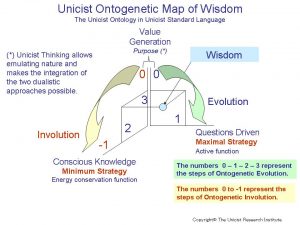There is an extreme confrontation of erudition with wisdom (but not vice versa). This was discovered in the research developed during more than 10 years in the field of Talent Development. The research was led by Peter Belohlavek.
Wisdom can be defined as the capacity of an individual to integrate idealism and realism with value adding actions. The characteristic of individuals who achieved wisdom is that they had multiple masters that had an authoritative role in their lives. These roles are still in force and the masters are still admired.
 Admiration and functional envy are the concepts that allow achieving wisdom. Individuals who admire others’ achievements and deeds have the opportunity to achieve wisdom, but only if they pursue the objective of adding value in an environment. The functional envy drives individuals to achieve goals.
Admiration and functional envy are the concepts that allow achieving wisdom. Individuals who admire others’ achievements and deeds have the opportunity to achieve wisdom, but only if they pursue the objective of adding value in an environment. The functional envy drives individuals to achieve goals.
Individuals with conflictive relations with authority can never achieve wisdom. They might be extremely erudite, extremely efficient workers but they will never be able to integrate idealism and realism with a value-adding attitude in their environment.
The apparent paradox of wisdom is the need of multiple masters. It is said that disciples are those learners who overcome their teachers. But wisdom, defined as the space where an individual has been able to integrate idealism and realism with value adding actions, cannot be overcome. What is the difference between Wisdom and Erudition?
Wisdom
Wisdom is a state that requires focusing on specific aspects of reality using questions to apprehend their nature and having the necessary knowledge of the environment in order to generate value.
Wisdom cannot be overcome because the nature of some aspect of reality has been understood and can be influenced.
But it has to be considered that wise people do not compete with others to have a place in the world. They earned their place in the world. That is why they remain masters in the field in which they are wise.
Erudition
 Erudition is an addiction that drives people to build a parallel hypothetical reality where they consider themselves wise. It is a frequent addiction of rationally gifted individuals.
Erudition is an addiction that drives people to build a parallel hypothetical reality where they consider themselves wise. It is a frequent addiction of rationally gifted individuals.
They are driven by envy which makes them accumulate data they use to judge the originators of the data while they try to demonstrate to others that they are wise.
This allows them confronting with others in their hypothetical reality and feel that their judgments make them wise. They manipulate in order to ensure that their hypothetical reality prevails over actual facts.
Conclusions
Competing with an authority in a field where she/he is wise is a demonstration that the need to gain supersedes the need to add value. The existence of multiple masters makes wisdom possible.
Erudition is not analogous to wisdom; it is a fallacious version of wisdom. Wisdom implies action while erudition does not.
Achieving wisdom cannot be a goal for a wise person; wisdom is the consequence of the action of an individual but does not cause it. It is unwise to try to achieve wisdom.
That is why wisdom is a pathway with multiple masters. Masters are ordinary or extraordinary people who have achieved wisdom in some field. Look for them while you continue adding value.
To achieve wisdom you need to abandon your modesty and expand your humbleness. Wise people do not need to be right, they just have to be functional.
Academic Committee
NOTE: The Unicist Research Institute was the pioneer in using the unicist logical approach in complexity science research and became a private global decentralized leading research organization in the field of human adaptive systems. It has an academic arm and a business arm.
https://www.unicist.org/conceptual-thinking/wp-content/uploads/2016/03/turi.pdf